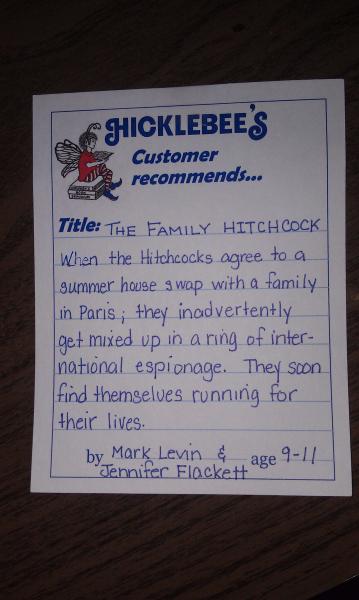Teen Reviews Help Make Better Booksellers
To find out if teenagers still love the undead, want more werewolves or something else, some indie booksellers ask teens to write their own reviews, which are posted in-store or in e-newsletters. “As adults, we read in a different way than kids do, so it’s important for us to look at what kids are actually reading and why. It helps us be better booksellers overall,” said Ann Seaton, manager of Hicklebee’s in San Jose, California.
At The Bookworm in Omaha, Nebraska, the guidelines for reviews are loose. “We ask for 50 words expressing why you like the book, with a sentence about theme or main subject but not a plot summary,” said Manager Ellen Scott.
The Bookworm makes ARCs available to teen readers once they’ve committed to reading and reviewing them. “They can pick out whatever they want, and if they really like it, they write a review,” Scott said. “But this is perhaps where I need to be more structured because lots of kids will read particular books but they don’t follow through with a review as often as I’d like.”
When a review is published in the store e-newsletter and/or as a shelf-talker, the writer gets a store gift card for a small amount.
 Scott said the reviews help bridge the age divide for booksellers at The Bookworm, as well as for parents and teachers. “I know what I like to read, but I don’t know that kids are necessarily going to like the same thing. Reading about zombies wouldn’t be my first choice, but if that’s what kids like, then that’s what I want to know about. That’s the whole key to this — getting the right books in the right hands.”
Scott said the reviews help bridge the age divide for booksellers at The Bookworm, as well as for parents and teachers. “I know what I like to read, but I don’t know that kids are necessarily going to like the same thing. Reading about zombies wouldn’t be my first choice, but if that’s what kids like, then that’s what I want to know about. That’s the whole key to this — getting the right books in the right hands.”
Hicklebee’s Seaton said that the store has experimented with teen reviews and would like to expand the program.
Would-be reviewers, who are Hicklebee’s regulars, get a short tour and explanation of the ARC shelf. They are encouraged to pick something, note it on a sign-out sheet, and offer feedback. Sample shelf-talkers are provided so they have an idea of what’s expected, but “we pretty much leave it up to the kid,” said Seaton, who does suggest listing a comparable title or two. The age and name of the reviewer are also included.
Becoming a teen reviewer has its perks. “They’re readers the way we’re readers, so when they see all the possibilities in front of them, their eyes just light up,” Seaton said. “They especially like having an inside track, and having adults want your feedback is very empowering.”
Liberty Bay Books in Poulsbo, Washington, runs its teen review program during summer break. “They choose any ARC, read it, and bring it back for another ARC,” said store owner Suzanne Droppert. “We ask [kids] ages 12 and up. For first-time readers of ARCs, we explain to the parents that they should check if the books are appropriate for their child.” Reviewers can sometimes keep the ARC, and there’s a pizza party at the end of the summer.
Reviews are posted on shelf-talkers and include the first name and age of the reviewer. “The age listed on shelf-talker says it all, especially if we are not handselling it,” Droppert said, adding that the reviews are also helpful to staff when they are handselling and assist in keeping them up to date on teen titles.
Liberty Bay also has several reviewers in their older teens and early 20s who read and review throughout the year. “They take a stack, read, and bring them back with reviews if they enjoyed the books,” said Droppert.
The program gives Liberty Bay staff important insight and provides not only great peer-to-peer recommendations, but good PR as well. Reviewers tell their friends, who then want to read and review ARCs, too. Word of Liberty Bay’s review program spread to the high school librarian, who has offered to coordinate a small library of ARCs for students to read and review over Thanksgiving and Christmas. Their responses will help both the librarian and Liberty Bay buy for next year.